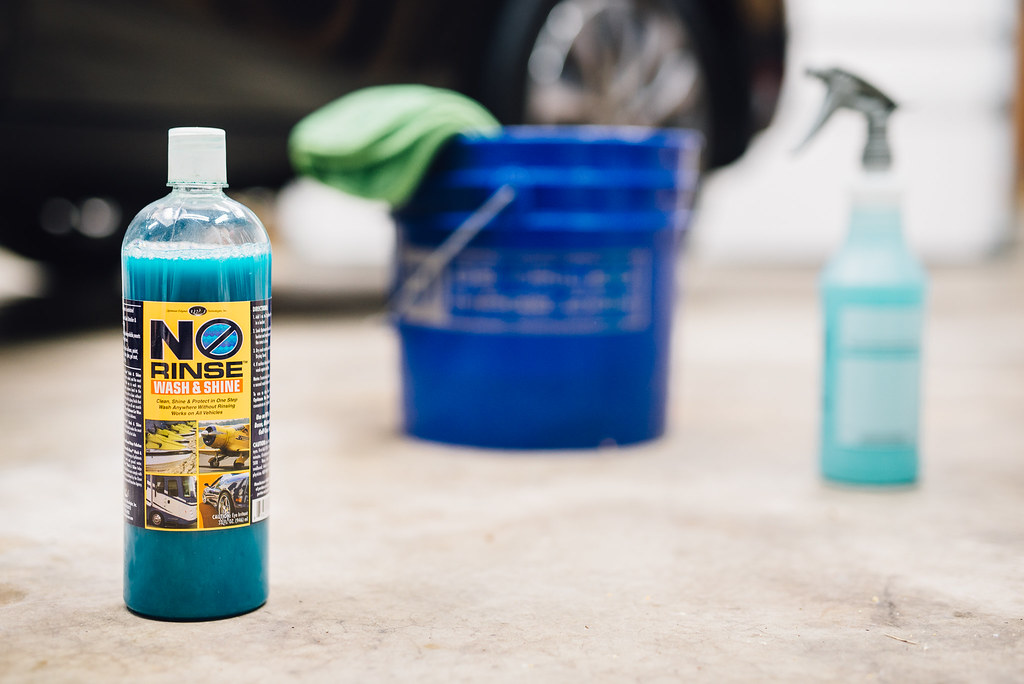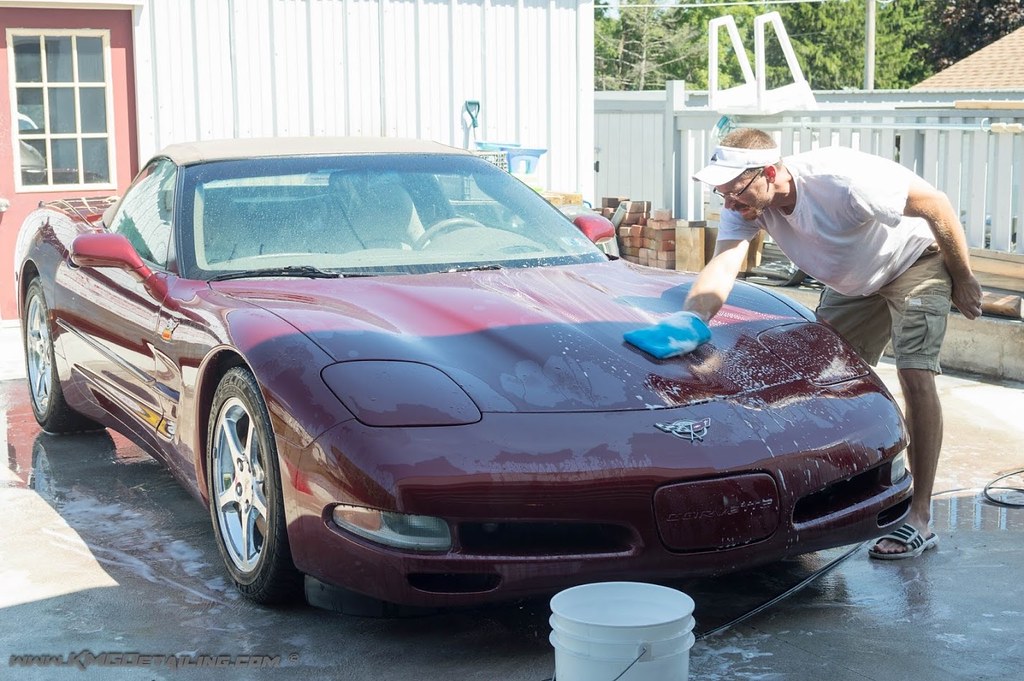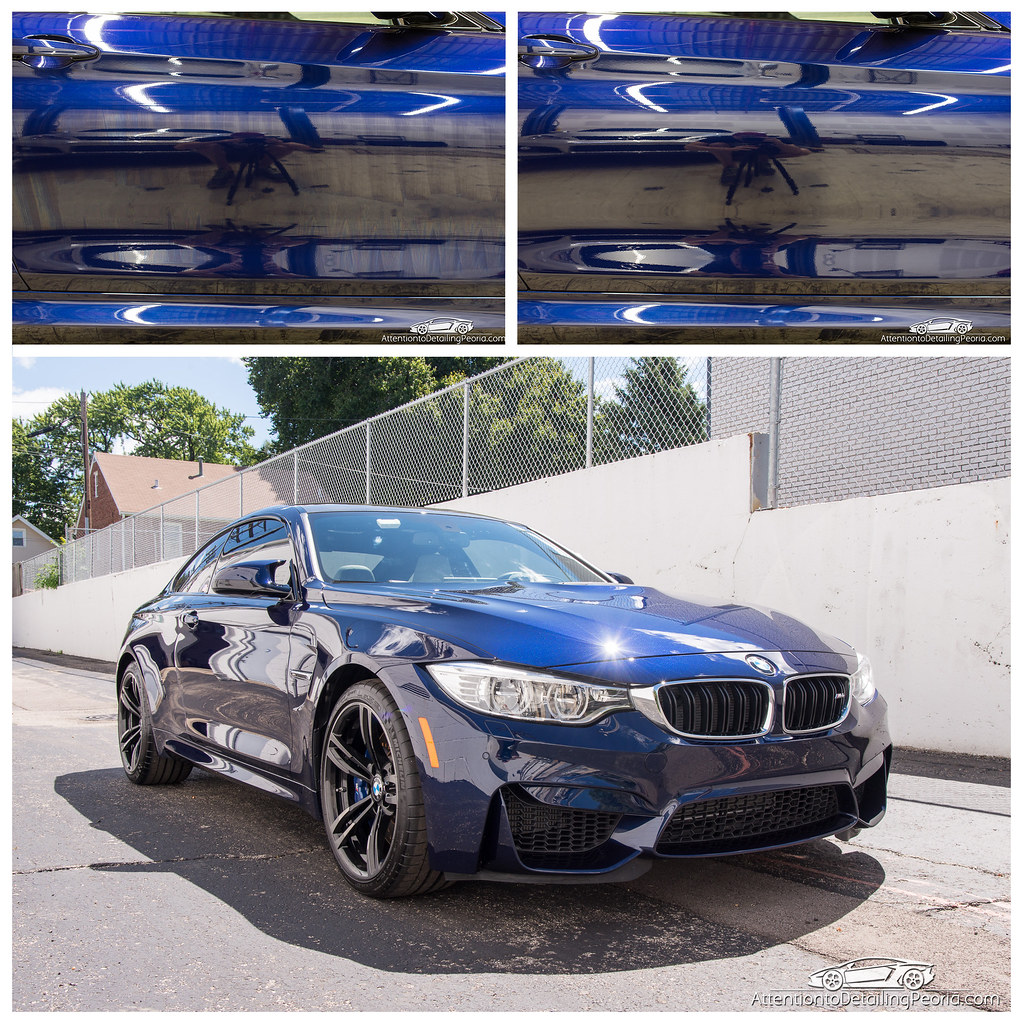3 Products I Was Skeptical Of…Until I Used Them
by Zach McGovernRinseless & Waterless Wash Products
I had grown up cleaning cars with a beat up sponge and old bath towels, so when I learned about the proper three bucket system with grit guards, sheepskin or microfiber mitts, and proper microfiber towels, my world was changed forever. The theory behind this method seemed sound, and the results speak for themselves, so naturally when I was told that it was possible to safely wash a vehicle without a hose, without multiple buckets, without wash mitts, without grit guards, and without shampoo, I was pretty unsure. In fact, it took me a while to even work up the courage to try this crazy idea out for myself… man am I glad I gave it a shot!
The three bucket washing system is great, no doubt about it, but it can be pretty cumbersome to do on a weekly basis. A well-maintained car does not generally get too dirty in between weekly or bi-weekly washes, therefore the process of soaking the car with water and suds for cleaning and lubrication is truly not necessary. I found that on average it would take me about an hour to wash a car and an hour and a half to wash an SUV using the traditional method.

Rinseless and Waterless washing drastically reduces the amount of time, products, and effort that goes in to the washing process. I now find that I can complete a proper rinseless wash on my SUV in 45 minutes or less in most cases (without even pulling the car out of the garage), and yes, it is completely safe! To be quite honest, I rarely do a traditional wash on either of our vehicles. Regular rinseless washes have been the most efficient way for me to keep our cars looking outstanding without sacrificing a lot of my time.
If you are on the fence about using a rinseless product, I’d recommend picking up some Optimum No Rinse and giving it a shot. I have demonstrated this process to many friends, customers, and other car enthusiasts over the years and most people absolutely love it after they have tried it for themselves.
NanoSkin Mitts & Towels
Using a clay bar is one of the most simple parts of the detailing process, but on a heavily contaminated vehicle, it can be a time-consuming task. Nano Skin products claimed to speed up this process immensely while also lasting longer than traditional clay. Detailing clay is something that has been around for as long as I have been into detailing, and I had never heard of another product trying to replace good old-fashioned clay bar until these synthetic options came out several years ago. I had a feeling it was going to be one of those “too good to be true” experiences, but after spending some time with the Nano Skin Mitts and Towels, I very rarely reach for a traditional clay bar, and I know many others operate the same way as Kevin George demonstrates in the following photo.

These synthetic clay substitutes allow me to remove bonded contaminates much quicker and easier than I could before. The time required to clay a vehicle was reduced from around an hour to less than thirty minutes in most cases. One important thing to note is that I have found these products to be considerably more aggressive than traditional clay in that the chances of marring the paint, especially softer paint, is quite high. In general, I personally only recommend mechanical decontamination of any kind if you intend to follow up with at least a light machine polishing process.
Nano Coatings
Coating products are now considered the pinnacle of vehicle protection by a large amount of professionals and enthusiasts in the car care community, however not too long ago these products were quite new, and some of the claimed benefits seemed almost too good to be true. Nevertheless, I was very intrigued by these products as they started to gain more attention, so I had to try them for myself. It has been roughly 5 years since I first started experimenting with coating products, and I can honestly say I will not go back to the “old school” way of doing things. I use a variety of coating products to protect all parts of my vehicles including paint, plastic, wheels, glass, and leather.

The biggest perk of using a coating product on a variety of surfaces to me is simply the ease of maintenance after application. Of course, there are many other benefits, such as exceptional durability and a candy-like gloss, that I love as well. We have a considerable amount of informative articles regarding paint coatings already published on the blog, here are some of my favorites…
- Paint Coatings: Why You Should Give Them a Shot by Reece @ DI
- The Truth Behind Wild Coating Claims by Zach McGovern
- Coating Warranties…Valuable? by Greg Gellas
- What Coating Should I Buy? by Zach McGovern








I’ve been doing 99% rinseless washes on my personal vehicles for 5 years now.
I did pull out the hose and pressure washer to coat them with Gyeon Wet Coat.
I tell my detailing clients about rinseless washes with ONR, they think it is “voodoo” until I show them how easy it is!
Rinseless washes are absolutely something that needs to be demonstrated. It is very difficult for someone who has no prior knowledge to grasp what you are trying to explain. Like you, I had many clients who thought I was just speaking gibberish until I demonstrated the product/process for them and they’ve been hooked ever since.
Great article! Are you back in the detailing game?!
Hi Joe – I have not been detailing professionally for almost 2 years, however I will continue to remain engaged here on the Ask-A-Pro Blog. I’m still a detailer at heart and I love having the opportunity to continue producing content for the blog. Thanks for reading!
Zach so all these coating maintenance sprays out I really don’t care for them. Can I use cancoat as a coating topper every 4-6 months has anyone tried this
Hi Matt – I do not see any reason why you cannot use CanCoat in lieu of a traditional spray sealant. For what it is worth, I have done some testing with Can Coat and did not see anywhere near 6 months of hydrophobic properties from it, so I had to opt to use Cure after each wash to maintain the hydrophobic surface.
Cure works better than Can Coat? This I did not know. I have been using Hydrosilex as my 3-6 month top coat to keep my ceramic alive and give the hydrophobic some boost when needed. Not sure if Cure or Reload is better, equal or what compared to Hydrosilex?
Sorry, My previous comment was not clear. I did not mean to imply that I had compared Can Coat to Cure. I was simply stating that, in my experience, Can Coat did not provide 6 months of strong water resistance. In order to maintain a hydrophobic surface, I chose to use Cure on top of Can Coat.
Great write up’s as always!
But a 3 Bucket Wash?? Zack, is that a typo?
Angus – no, it is not a typo at all. 3 buckets are the common system – 1 specific for wheels and tires and 2 for washing the paint. The following article breaks it down: https://www.detailedimage.com/Ask-a-Pro/how-to-properly-wash-and-dry-a-car/
Ah ok. I never thought about it that way. I too use a dedicated wheel/tire bucket filled with brushes that don’t go anywhere near my paint.
Thanks for the clarification!
Nanoskin has completely replaced clay for me too. I hear of some people getting marring from Nanoskin and I ask them what they are using for lubrication and invariably I hear soap and water. While soap and water may provide some lubrication, a good old fashioned clay lube works much better. I’m still using Prima Glide and even on Japanese paint systems I haven’t seen much marring, as even with clay you could alway get some marring. Get a good quality lube and save some time fixing your mistakes. If you plan to polish after claying it really doesn’t matter what lube you use.
Zach, I am in NJ and winter is coming and the water will freeze. I want to be able to pull my car into my small garage and turn the propane heat on and use a waterless wash to clean my daily driven car that will see salt, dirt etc. What is the best waterless wash I can buy to do this and not harm any coatings on my paint or is there an easier or better way to do this during the cold winter without water?
Hi William – I live in the midwest where we see our fair share of snow, ice, and salt during the winters. Myself and many others follow a maintenance plan that utilizes coin-op power washes paired with a rinseless or waterless wash.
To elaborate, in the winter months, I take my vehicle to a nearby coin-op pressure wash to blast away the dirt and salt buildup with their warm, soapy water. After rinsing, I make the short drive home to my garage where I pull the car in and finish with a rinseless wash using a bucket of warm water with Optimum No Rinse. You may also opt for a waterless wash. My personal favorite is CarPro EcH2O at this point, though I have not tried many others to be honest. This process has proven very safe and effective in the winter months as it allows me to remove heavy dirt and salt buildup without touching the car, then I remove the light dirt that remains with the hand wash at home. Ivan Rajic explained this same process in his old article here: https://www.detailedimage.com/Ask-a-Pro/winter-washing-with-optimum-no-rinse-onr/
Hi Zach,
Thank you for the fine details as it is very much appreciated! That might be the route I will have to take this winter. I was hoping to skip the power washing part and just find the best spray on waterless wash for my i8 since there is no local coin-op place by me. I’m wondering if my local hand wash place would be willing to use my RESET CarPro soap instead of theirs to protect my Wet Coat and Hydrosilex I just put on yesterday to survive the winter.
Side Note: you could pass for Ryan Reynolds brother lol
Hi Zach,
Thanks for the article. Re: Rinseless washing, maybe I’m just a luddite, but I don’t understand how it can be safe to rub a damp sponge or MF across dirt or even dust without rinsing it off first. I also don’t understand why if you have access to hose, you wouldn’t use it? I used to do a lot of rinseless washing when I lived in an apartment, but to me it just seems like it’s not as safe as a traditional wash, and I don’t see how it can save anyone so much time if the only steps you’re really skipping are hosing the car off once at the beginning, and one at the end. Am I being too nervous / harsh on rinseless here? Thanks!